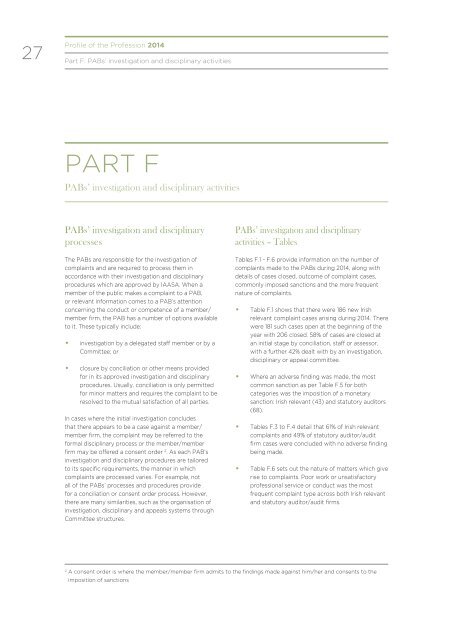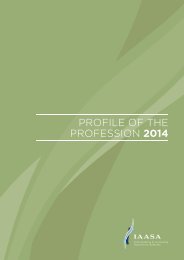PROFILE OF THE PROFESSION 2014
You also want an ePaper? Increase the reach of your titles
YUMPU automatically turns print PDFs into web optimized ePapers that Google loves.
Profile of the Profession <strong>2014</strong><br />
27<br />
Part F: PABs’ investigation and disciplinary activities<br />
PART F<br />
PABs’ investigation and disciplinary activities<br />
PABs’ investigation and disciplinary<br />
processes<br />
The PABs are responsible for the investigation of<br />
complaints and are required to process them in<br />
accordance with their investigation and disciplinary<br />
procedures which are approved by IAASA. When a<br />
member of the public makes a complaint to a PAB,<br />
or relevant information comes to a PAB’s attention<br />
concerning the conduct or competence of a member/<br />
member firm, the PAB has a number of options available<br />
to it. These typically include:<br />
• investigation by a delegated staff member or by a<br />
Committee; or<br />
• closure by conciliation or other means provided<br />
for in its approved investigation and disciplinary<br />
procedures. Usually, conciliation is only permitted<br />
for minor matters and requires the complaint to be<br />
resolved to the mutual satisfaction of all parties.<br />
In cases where the initial investigation concludes<br />
that there appears to be a case against a member/<br />
member firm, the complaint may be referred to the<br />
formal disciplinary process or the member/member<br />
firm may be offered a consent order 2 . As each PAB’s<br />
investigation and disciplinary procedures are tailored<br />
to its specific requirements, the manner in which<br />
complaints are processed varies. For example, not<br />
all of the PABs’ processes and procedures provide<br />
for a conciliation or consent order process. However,<br />
there are many similarities, such as the organisation of<br />
investigation, disciplinary and appeals systems through<br />
Committee structures.<br />
PABs’ investigation and disciplinary<br />
activities – Tables<br />
Tables F.1 - F.6 provide information on the number of<br />
complaints made to the PABs during <strong>2014</strong>, along with<br />
details of cases closed, outcome of complaint cases,<br />
commonly imposed sanctions and the more frequent<br />
nature of complaints.<br />
• Table F.1 shows that there were 186 new Irish<br />
relevant complaint cases arising during <strong>2014</strong>. There<br />
were 181 such cases open at the beginning of the<br />
year with 206 closed. 58% of cases are closed at<br />
an initial stage by conciliation, staff or assessor,<br />
with a further 42% dealt with by an investigation,<br />
disciplinary or appeal committee.<br />
• Where an adverse finding was made, the most<br />
common sanction as per Table F.5 for both<br />
categories was the imposition of a monetary<br />
sanction: Irish relevant (43) and statutory auditors<br />
(68).<br />
• Tables F.3 to F.4 detail that 61% of Irish relevant<br />
complaints and 49% of statutory auditor/audit<br />
firm cases were concluded with no adverse finding<br />
being made.<br />
• Table F.6 sets out the nature of matters which give<br />
rise to complaints. Poor work or unsatisfactory<br />
professional service or conduct was the most<br />
frequent complaint type across both Irish relevant<br />
and statutory auditor/audit firms.<br />
2<br />
A consent order is where the member/member firm admits to the findings made against him/her and consents to the<br />
imposition of sanctions




